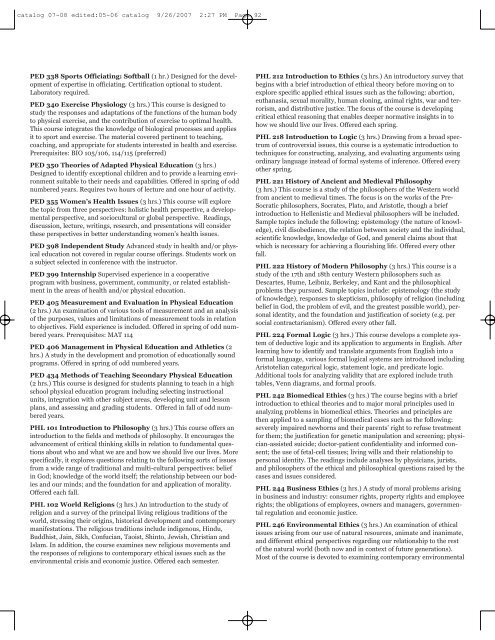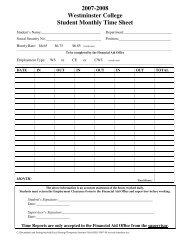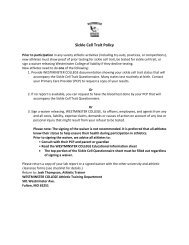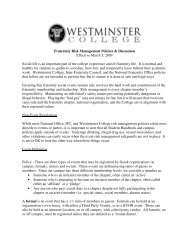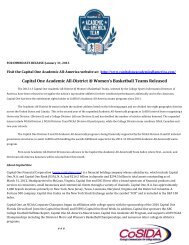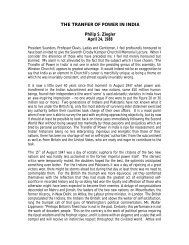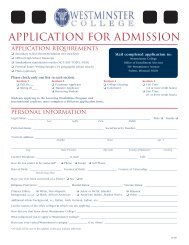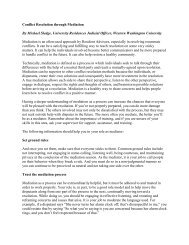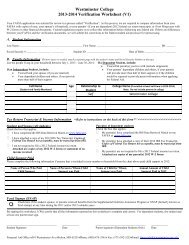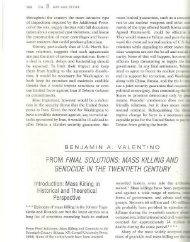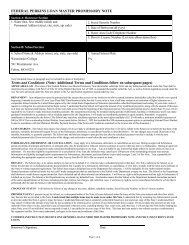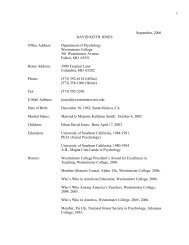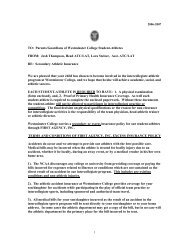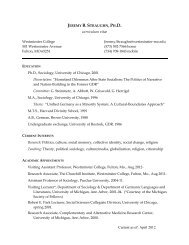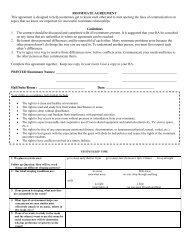catalog 07-08 edited:05-06 catalog.qxd - Westminster College
catalog 07-08 edited:05-06 catalog.qxd - Westminster College
catalog 07-08 edited:05-06 catalog.qxd - Westminster College
You also want an ePaper? Increase the reach of your titles
YUMPU automatically turns print PDFs into web optimized ePapers that Google loves.
<strong>catalog</strong><strong>07</strong>-<strong>08</strong><strong>edited</strong>:<strong>05</strong>-<strong>06</strong><strong>catalog</strong> 9/26/20<strong>07</strong> 2:27PM Page92PED 338 Sports Officiating: Softball (1 hr.) Designed for the developmentof expertise in officiating. Certification optional to student.Laboratory required.PED 340 Exercise Physiology (3 hrs.) This course is designed tostudy the responses and adaptations of the functions of the human bodyto physical exercise, and the contribution of exercise to optimal health.This course integrates the knowledge of biological processes and appliesit to sport and exercise. The material covered pertinent to teaching,coaching, and appropriate for students interested in health and exercise.Prerequisites: BIO 1<strong>05</strong>/1<strong>06</strong>, 114/115 (preferred)PED 350 Theories of Adapted Physical Education (3 hrs.)Designed to identify exceptional children and to provide a learning environmentsuitable to their needs and capabilities. Offered in spring of oddnumbered years. Requires two hours of lecture and one hour of activity.PED 355 Women’s Health Issues (3 hrs.) This course will explorethe topic from three perspectives: holistic health perspective, a developmentalperspective, and sociocultural or global perspective. Readings,discussion, lecture, writings, research, and presentations will considerthese perspectives in better understanding women’s health issues.PED 398 Independent Study Advanced study in health and/or physicaleducation not covered in regular course offerings. Students work ona subject selected in conference with the instructor.PED 399 Internship Supervised experience in a cooperativeprogram with business, government, community, or related establishmentin the areas of health and/or physical education.PED 4<strong>05</strong> Measurement and Evaluation in Physical Education(2 hrs.) An examination of various tools of measurement and an analysisof the purposes, values and limitations of measurement tools in relationto objectives. Field experience is included. Offered in spring of odd numberedyears. Prerequisites: MAT 114PED 4<strong>06</strong> Management in Physical Education and Athletics (2hrs.) A study in the development and promotion of educationally soundprograms. Offered in spring of odd numbered years.PED 434 Methods of Teaching Secondary Physical Education(2 hrs.) This course is designed for students planning to teach in a highschool physical education program including selecting instructionalunits, integration with other subject areas, developing unit and lessonplans, and assessing and grading students. Offered in fall of odd numberedyears.PHL 101 Introduction to Philosophy (3 hrs.) This course offers anintroduction to the fields and methods of philosophy. It encourages theadvancement of critical thinking skills in relation to fundamental questionsabout who and what we are and how we should live our lives. Morespecifically, it explores questions relating to the following sorts of issuesfrom a wide range of traditional and multi-cultural perspectives: beliefin God; knowledge of the world itself; the relationship between our bodiesand our minds; and the foundation for and application of morality.Offered each fall.PHL 102 World Religions (3 hrs.) An introduction to the study ofreligion and a survey of the principal living religious traditions of theworld, stressing their origins, historical development and contemporarymanifestations. The religious traditions include indigenous, Hindu,Buddhist, Jain, Sikh, Confucian, Taoist, Shinto, Jewish, Christian andIslam. In addition, the course examines new religious movements andthe responses of religions to contemporary ethical issues such as theenvironmental crisis and economic justice. Offered each semester.PHL 212 Introduction to Ethics (3 hrs.) An introductory survey thatbegins with a brief introduction of ethical theory before moving on toexplore specific applied ethical issues such as the following: abortion,euthanasia, sexual morality, human cloning, animal rights, war and terrorism,and distributive justice. The focus of the course is developingcritical ethical reasoning that enables deeper normative insights in tohow we should live our lives. Offered each spring.PHL 218 Introduction to Logic (3 hrs.) Drawing from a broad spectrumof controversial issues, this course is a systematic introduction totechniques for constructing, analyzing, and evaluating arguments usingordinary language instead of formal systems of inference. Offered everyother spring.PHL 221 History of Ancient and Medieval Philosophy(3 hrs.) This course is a study of the philosophers of the Western worldfrom ancient to medieval times. The focus is on the works of the Pre-Socratic philosophers, Socrates, Plato, and Aristotle, though a briefintroduction to Hellenistic and Medieval philosophers will be included.Sample topics include the following: epistemology (the nature of knowledge),civil disobedience, the relation between society and the individual,scientific knowledge, knowledge of God, and general claims about thatwhich is necessary for achieving a flourishing life. Offered every otherfall.PHL 222 History of Modern Philosophy (3 hrs.) This course is astudy of the 17th and 18th century Western philosophers such asDescartes, Hume, Leibniz, Berkeley, and Kant and the philosophicalproblems they pursued. Sample topics include: epistemology (the studyof knowledge), responses to skepticism, philosophy of religion (includingbelief in God, the problem of evil, and the greatest possible world), personalidentity, and the foundation and justification of society (e.g. persocial contractarianism). Offered every other fall.PHL 224 Formal Logic (3 hrs.) This course develops a complete systemof deductive logic and its application to arguments in English. Afterlearning how to identify and translate arguments from English into aformal language, various formal logical systems are introduced includingAristotelian categorical logic, statement logic, and predicate logic.Additional tools for analyzing validity that are explored include truthtables, Venn diagrams, and formal proofs.PHL 242 Biomedical Ethics (3 hrs.) The course begins with a briefintroduction to ethical theories and to major moral principles used inanalyzing problems in biomedical ethics. Theories and principles arethen applied to a sampling of biomedical cases such as the following:severely impaired newborns and their parents’ right to refuse treatmentfor them; the justification for genetic manipulation and screening; physician-assistedsuicide; doctor-patient confidentiality and informed consent;the use of fetal-cell tissues; living wills and their relationship topersonal identity. The readings include analyses by physicians, jurists,and philosophers of the ethical and philosophical questions raised by thecases and issues considered.PHL 244 Business Ethics (3 hrs.) A study of moral problems arisingin business and industry: consumer rights, property rights and employeerights; the obligations of employees, owners and managers, governmentalregulation and economic justice.PHL 246 Environmental Ethics (3 hrs.) An examination of ethicalissues arising from our use of natural resources, animate and inanimate,and different ethical perspectives regarding our relationship to the restof the natural world (both now and in context of future generations).Most of the course is devoted to examining contemporary environmental


